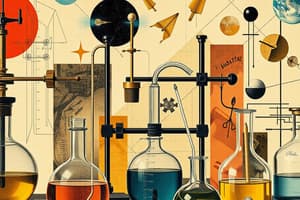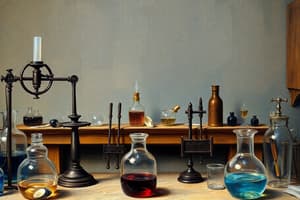Podcast
Questions and Answers
Match the following laboratory equipment with their primary usage:
Match the following laboratory equipment with their primary usage:
Thermometer = Measuring temperature Bunsen burner = Heating substances Beaker = Holding and mixing liquids Pipette = Transferring small volumes of liquid
What is the purpose of adding excess calcium carbonate to hydrochloric acid?
What is the purpose of adding excess calcium carbonate to hydrochloric acid?
To ensure all the hydrochloric acid reacts
What is used to filter the solution of calcium chloride?
What is used to filter the solution of calcium chloride?
- Funnel (correct)
- Measuring Cylinder
- Pipette
- Beaker
The solution of calcium chloride can be tested with indicator paper.
The solution of calcium chloride can be tested with indicator paper.
The heating source used in the laboratory is a ______.
The heating source used in the laboratory is a ______.
What is the result of burning magnesium?
What is the result of burning magnesium?
Which acid is used in the reaction described?
Which acid is used in the reaction described?
Flashcards are hidden until you start studying
Study Notes
Chemical Laboratory Apparatus and Procedures
- Thermometers and Condensers: Essential for monitoring temperature and condensing vapors during chemical reactions.
- Fractionating Column: Used to separate mixtures based on different boiling points; aids in distillation.
- Beakers and Flasks: Common laboratory glassware for holding, mixing, and heating chemicals.
- Funnel: Facilitates the transfer of liquids into containers, minimizing spillage.
- Gas Jar: Used to collect and store gases produced in reactions.
Calcium Carbonate Reaction
- Procedure:
- Excess calcium carbonate added to dilute hydrochloric acid.
- Solution filtered to remove undissolved calcium carbonate, yielding a calcium chloride solution.
- Indicator paper tests the resultant solution for acidity.
Sulfuric Acid Reaction
- Experiment Steps:
- Measure 50 cm³ of dilute sulfuric acid into a beaker.
- Introduce copper oxide to the acid gradually until total reaction occurs, indicating complete conversion.
Magnesium Oxide Formation
- Process: Magnesium burns to produce magnesium oxide in the presence of heat, which can be tested using indicators.
- Indicator Test: Reactants tested with universal indicator to determine pH change, indicating conversion to magnesium hydroxide.
Common Equipment
- Bunsen Burners: Provide controlled flame for heating and reactions.
- Retort Stands and Tripod Stands: Support apparatus during experiments.
- Pipettes and Burettes: Precise measurement of liquids; common in titration methods.
Safety and Accuracy
- Protective Equipment: Use of tongs and other safety gear is crucial when handling hot or reactive substances.
- Measuring Tools: Accurate measurements using graduated cylinders and pipettes ensure reproducible results in experiments.
General Tips
- Familiarize with lab equipment for smoother experimentation.
- Always test solutions with indicators to safely assess chemical properties.
Miscellaneous
- Involves handling various acids such as hydrochloric acid and nitric acid - ensure proper handling measures.
- Throughout experiments, maintain clean workspaces and adhere to safety protocols to mitigate hazards.
Studying That Suits You
Use AI to generate personalized quizzes and flashcards to suit your learning preferences.



